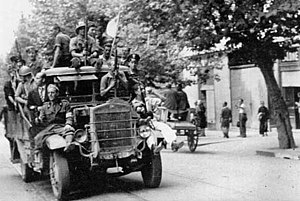
Back Vier Tage von Neapel German Cuatro Días de Nápoles Spanish Napoliko lau egunak Basque Quatre journées de Naples French ארבעת הימים של נאפולי HE Quattro giornate di Napoli Italian Vier Dagen van Napels Dutch Insureccion de Napòli Occitan Rebelião de Nápoles Portuguese Четыре дня Неаполя Russian
This article has multiple issues. Please help improve it or discuss these issues on the talk page. (Learn how and when to remove these messages)
|
| Four Days of Naples Quattro giornate di Napoli | |||||||
|---|---|---|---|---|---|---|---|
| Part of the Italian Campaign of World War II | |||||||
 Italian partisans celebrating the liberation of Naples | |||||||
| |||||||
| Belligerents | |||||||
|
|
| ||||||
| Commanders and leaders | |||||||
|
• Antonio Tarsia in Curia (Vomero) • Giovanni Abbate (Vomero) • Ermete Bonomi (Materdei) • Carmine Musella (Avvocata) • Carlo Bianco • Aurelio Spoto (Capodimonte) • Stefano Fadda (Chiaia) • Francesco Cibarelli • Amedeo Manzo • Francesco Bilardo (Via Duomo) • Gennaro Zengo (Corso Giuseppe Garibaldi) • Francesco Amicarelli (Piazza Mazzini) • Mario Orbitello (Montecalvario) • Salvatore Amato (Museo) • Alberto Agresti]] (Via Caracciolo, Posillipo) • Raffaele Viglione (Piazza Carlo III) • Tito Murolo (Vasto)[1] |
(Commander of the Military Area of Naples) (Provincial Federal fascist leader of Naples) | ||||||
| Strength | |||||||
| 1,589[2] | 20,000 | ||||||
| Casualties and losses | |||||||
|
168 killed 162 wounded | 54–96 killed | ||||||
|
159 unarmed civilians Total= 562 killed | |||||||
The Four Days of Naples (Italian: Quattro giornate di Napoli) was an uprising in Naples, Italy, against Nazi German occupation forces from 27 September to 30 September 1943, immediately prior to the arrival of Allied forces in Naples on 1 October during World War II.
The spontaneous uprising of Neapolitan and Italian Resistance against German occupying forces, despite their limited armament, and without proper organization or planning, successfully disrupted German plans to deport Neapolitans en masse, destroy the city, and prevent Allied forces from gaining a strategic foothold.
The city was subsequently awarded the Gold Medal of Military Valor. The four days are celebrated annually and were the subject of the 1962 film The Four Days of Naples.
- ^ Corrado Barbagallo, "Napoli contro il terrore nazista", Casa editrice Maone, Napoli, 1944.
- ^ "Iniziano le 4 giornate di Napoli il 27 settembre 1943". Me.Dia.Re. 27 September 2018. Retrieved 13 April 2021.